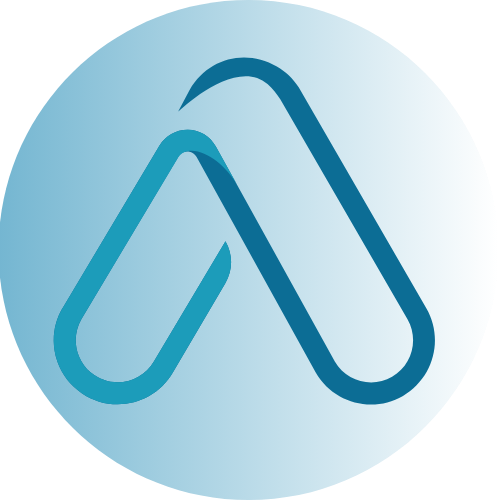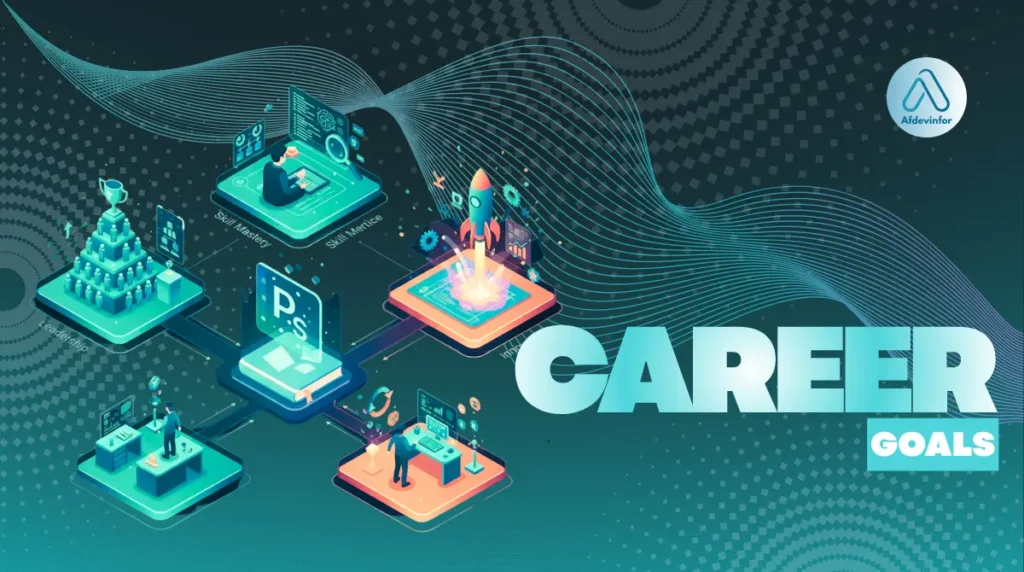Knowing how to answer career goals question is a challenge that trips up even the most seasoned professionals. I’ve seen it countless times: a candidate is acing an interview, and then this question lands, causing a moment of panic. But I want you to reframe this. It’s not a trap; it’s your single biggest opportunity to connect your personal story to the company’s future. As a core part of my guidance on effective job interview preparation, I’ve found that mastering this response separates good candidates from hired ones. Instead of giving you a generic script, this guide will provide a strategic framework to help you craft an answer that is both authentic and impressive, making it one of the most powerful tools in your arsenal of interview questions and answers. An interviewer is really trying to understand a few key things about you.
Here’s what they’re truly assessing:
- ✔️ Ambition & Drive: Do you have a vision for your future? Are you proactive about your growth, or are you just looking for any job?
- ✔️ Cultural Fit & Alignment: Do your goals align with the opportunities this company can provide? Are you looking for growth in areas where they can support you?
- ✔️ Self-Awareness: Do you understand your own strengths and the direction you want to take? A candidate with clear goals is often more focused and motivated.
- ✔️ Long-Term Potential: Are you viewing this role as a mere stepping stone to somewhere else, or do you see a potential future with the company?
1.1. It’s more than just a question; it’s a test of fit
Think of yourself as a puzzle piece and the company as the puzzle. Your answer to the career goals question reveals the shape of your edges. A well-crafted response shows the interviewer exactly how your piece fits perfectly into their picture, suggesting not just immediate value but long-term harmony. Hiring managers use this question to gauge the likelihood of retention. They are investing significant resources in hiring and training you, and they want to know if that investment will pay off. When your personal ambition connects to the company’s future, you signal that you’re a candidate who is likely to stay, grow, and contribute for years to come. This focus on professional growth is a two-way street; they want to see that your development goals can be met within their organization, creating a mutually beneficial relationship.
As a hiring manager I once worked with told me, ‘We’re not just hiring for a role; we’re investing in a future leader. I need to see that their vision for themselves has a place in our company’s vision for the future.’
2. The 4-step framework for crafting your perfect answer
Over my years in the tech and career development space, I’ve created a simple yet powerful framework to help people move beyond generic answers. This isn’t about memorizing a script; it’s a holistic approach that guides you from internal reflection to a polished, external presentation. By following this method, you can build a personalized, compelling answer that truly stands out. These are the core career development strategies I teach to help professionals articulate their ambitions effectively.
Here is a brief overview of my four-step process:
- Step 1: Self-Reflection: Define what you truly want from your career.
- Step 2: Company Research: Understand the company’s vision and the role’s trajectory.
- Step 3: Alignment: Connect your personal goals with the company’s needs.
- Step 4: Structuring the Answer: Deliver your response with a clear and memorable model.
2.1. Step 1: Start with self-reflection to define your true career aspirations
Before you can tell an interviewer what you want, you have to know it yourself. The most compelling answers are rooted in genuine self-awareness. I always advise people to spend quality time thinking about their short-term (1-2 years) and long-term (3-5 years) goals, completely independent of any specific job description. This clarity is the foundation of an authentic and confident response. Your personal career aspirations are your north star, guiding how you frame your answer.
To help you get started, here are some prompting questions I use myself:
Your Personal Goal-Setting Checklist
- What specific skills do I want to become an expert in over the next two years? (e.g., Python, project management software, public speaking)
- What kind of projects or tasks give me the most energy and satisfaction?
- What kind of impact do I want to make on my team or in my industry?
- What does ‘success’ look like for me in 5 years, beyond just a job title? (e.g., mentoring others, leading a key initiative, becoming a subject matter expert)
2.2. Step 2: Use our company research checklist
Once you have clarity on your personal goals, the next step is to understand the company you’re interviewing with. This goes far beyond just reading their homepage. You need to dig deep to find the points of connection between your aspirations and their reality. To make this practical, I’ve developed a checklist to guide your research and help you answer the critical question, ‘How do I align my career goals with a company’s mission?’
Here is The Afdevinfo Company Research Checklist:
- Analyze the Job Description Again: Look for keywords related to skills, responsibilities, and growth (e.g., ‘opportunity for advancement,’ ‘develop new systems’). This tells you what they value for this specific role.
- Review the Company’s Mission & Values Page: Don’t just read the words; find a value that genuinely resonates with your own professional ethos. Be prepared to mention it.
- Read Recent News and Annual Reports: Look for press releases, blog posts, or the latest annual report. Find out their strategic priorities. Are they expanding into new markets? Launching a new product line? This is where future opportunities lie.
- Explore Employee Profiles on LinkedIn: Find people who are in a similar role or the role you might want in a few years. Look at their career paths within the company. This provides a real-world map of potential professional growth.
- Check for Growth Stories: Look at the company blog or social media for spotlights on employee promotions or professional development programs. This shows they invest in their people.
2.3. Step 3: Align your goals with the company’s vision
This is where the magic happens. You’ll now synthesize your findings from your self-reflection (Step 1) and your company research (Step 2). The goal is to find the sweet spot—the genuine overlap between your personal ambition and the company’s needs. This alignment demonstrates that you are not just qualified for the job today, but that you are a strategic long-term hire. It’s one of the most effective career development strategies you can deploy in an interview.
I use a simple ‘connection formula’ to illustrate this:
[My Skill/Goal] + [Company Value/Project] = [Mutual Success Story]
Let’s look at a simple before-and-after example:
- Before Alignment: ‘My career goal is to become a manager.’ (This is self-serving and generic).
- After Alignment: ‘I was excited to see on your blog that your company values internal promotion and mentorship. My immediate goal is to master the skills in this role, and in the next 3-5 years, I aim to grow into a position where I can mentor new team members, contributing directly to your team’s long-term success and fostering the supportive culture you’ve built.’ (This is specific, aligned, and shows mutual benefit).
This approach transforms your personal goal into a shared objective, showing how your professional growth directly contributes to the company’s success.
2.4. Step 4: Structure your answer using the ‘present-future’ model
Now that you have the content, you need a clear, concise way to deliver it. I recommend my ‘Present-Future’ model. It’s a simple and memorable structure that ensures your answer is balanced, focused, and forward-thinking. It’s one of the best job search tips I can offer for interview success.
Part 1: The Present
Start by grounding your answer in the role you are applying for. Express genuine enthusiasm for the position and explain how it aligns with your immediate goals. Talk about the skills you want to build, the contributions you want to make, and how this role is the perfect next step for you. This shows the interviewer you are focused and ready to deliver value from day one.
Part 2: The Future
Next, connect the skills and experience you’ll gain in this role to a logical future step *within the company*. This is where you talk about your 3-5 year goals. The key here is to be specific but flexible. You’re not demanding a promotion; you’re showing that you’ve thought about a long-term future with them and are adaptable to how that might unfold. This demonstrates ambition and loyalty.
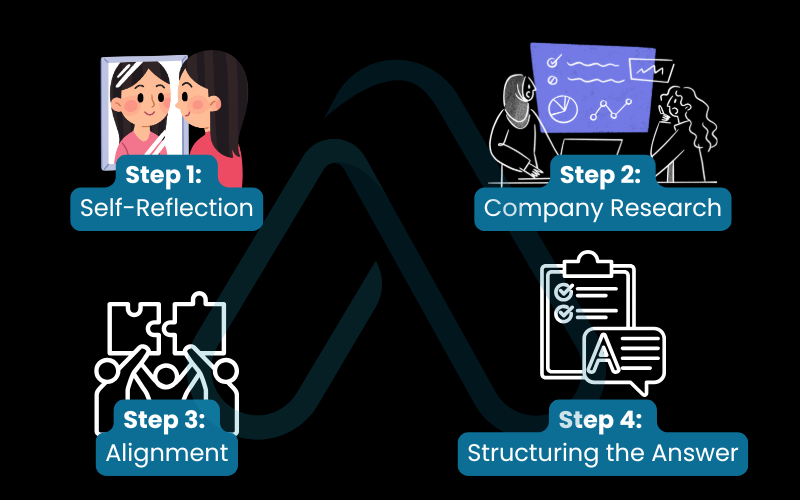
3. Psychological preparation: How to answer with confidence and authenticity
Knowing what to say is only half the battle. *How* you say it is equally, if not more, important. Many candidates I’ve coached feel a sense of impostor syndrome or nervousness when talking about their future, which can undermine an otherwise perfect answer. Remember, confidence isn’t about arrogance; it’s about believing in the value you bring and the vision you have for yourself. A study by the University of Glasgow found that an interviewer’s assessment of a candidate’s confidence was a significant predictor of hiring decisions. This section focuses on the delivery, a crucial part of learning how to answer the career goals question effectively.
3.1. The power of authentic career aspirations
Recruiters have heard every generic answer in the book. ‘I want to be in a leadership position’ or ‘I want to be with a company where I can grow.’ These aren’t bad, but they lack personality and conviction. I once sat in on an interview where a candidate gave a flawless, textbook answer. It was perfect but robotic. The next candidate shared a goal that was slightly less polished but deeply personal, connecting their passion for data analysis to a recent project the company had launched. They got the offer. Why? Because authenticity builds rapport and trust. Your genuine career aspirations, informed by the self-reflection you did in Step 1, are your unique selling proposition. Don’t be afraid to let your real personality and motivations shine through.
My key takeaway for you is this: Your unique story is your biggest strength. Don’t trade it for a generic script.
3.2. Practical techniques for building interview confidence
Confidence is a skill you can build with practice. As part of your job interview preparation, I recommend integrating these simple psychological techniques to help you feel and project more confidence when you deliver your answer.
Here are a few actionable tips:
- Practice Out Loud, Don’t Memorize: Rehearse your answer by speaking it aloud to yourself, a friend, or even your pet. The goal is to internalize the key points of your ‘Present-Future’ model, not to memorize a script word-for-word. This helps it sound natural and conversational. Why it works: Speaking reinforces neural pathways, making recall smoother under pressure and preventing you from sounding robotic.
- Use Power Posing: Before the interview (even a virtual one!), spend two minutes standing in a ‘power pose’—hands on hips, chin up, taking up space. Why it works: Research from social psychologist Amy Cuddy shows this can increase feelings of confidence and decrease stress hormones like cortisol.
- Control Your Breathing: If you feel anxiety creeping in, use the 4-7-8 breathing technique. Inhale for 4 seconds, hold for 7, and exhale slowly for 8. Do this a few times before the interview starts. Why it works: Slow, deep breathing activates the parasympathetic nervous system, which calms your body’s stress response.
- Maintain Positive Body Language: During the interview, sit up straight, maintain eye contact, and use natural hand gestures. Your non-verbal cues speak volumes. A confident posture signals engagement and self-assurance.
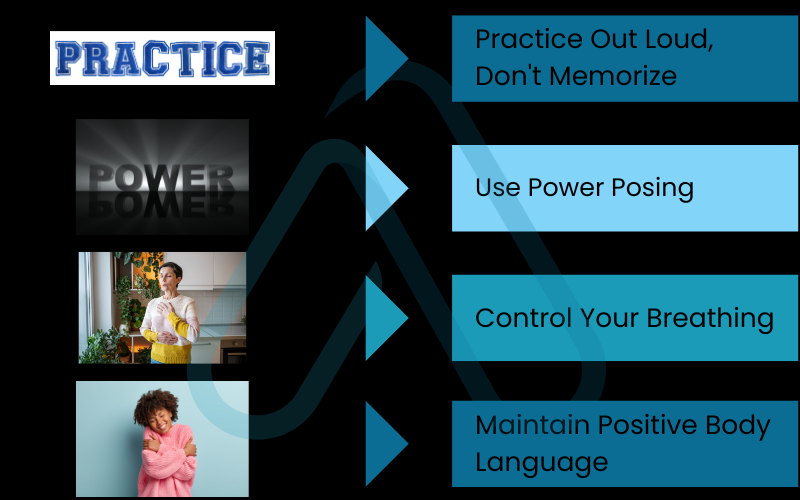
4. Tailored career goals examples for every career stage
To help you see my 4-step framework in action, I’ve put together some concrete examples. Please remember, these are not scripts to be copied. They are illustrations designed to inspire you and show you how to adapt the principles to your own unique situation. Each example will include a ‘Why It Works’ breakdown that references the framework we’ve discussed.
4.1. Example for the entry-level candidate
Role/Situation: Junior Marketing Associate
My immediate goal is to dive deep into this Junior Marketing Associate role and build a strong foundation in digital marketing execution. I’m especially excited to learn the specific analytics software you use to track campaign success, as I believe data-driven decisions are the future of marketing. Looking forward, over the next 3-5 years, I aim to become a true subject matter expert in one of the key areas this role touches, perhaps in SEO or content strategy. I saw on LinkedIn that some of your Marketing Managers started in this very role, and that kind of internal growth path is exactly what I’m looking for. My long-term goal is to be able to contribute to marketing strategy, using the hands-on experience I gain here.
Why It Works:
- Present Focus: It shows enthusiasm for learning the specific tools and responsibilities of the entry-level job.
- Future Vision: It connects that learning to a logical next step (becoming a subject matter expert) within the company.
- Company Research: It references a specific growth path seen on LinkedIn, showing the candidate has done their homework.
- Alignment: It frames their desire for professional growth as a direct benefit to the company (contributing to strategy).
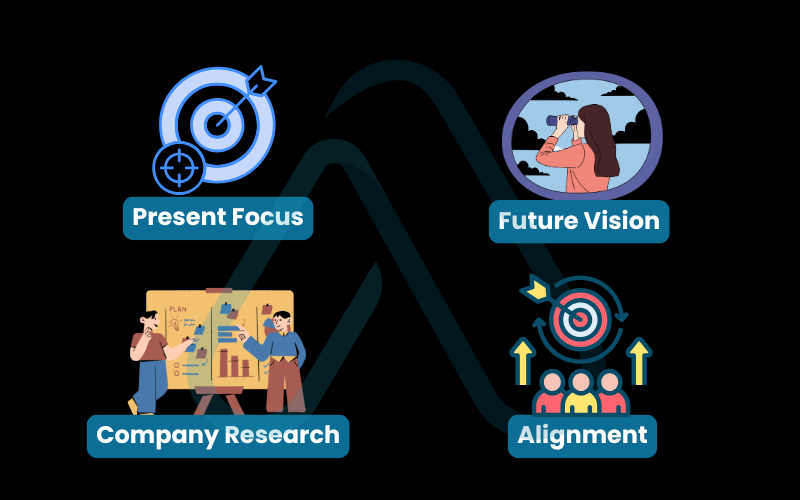
4.2. Example for the mid-career professional
Role/Situation: Senior Software Engineer
In the short term, my goal is to leverage my experience with Python and cloud architecture to contribute to your new fintech platform, which I read about in a recent press release. I’m keen to become an expert on your specific tech stack and coding standards to be a highly effective team member. As I look toward the next 3-5 years, I see my career goals evolving from purely technical execution to mentorship and technical leadership. I’m passionate about helping junior developers grow, and I’d eventually like to take on responsibilities like leading code reviews or architecting new features, which aligns with the leadership opportunities mentioned in the job description. My ultimate goal is to help scale the team’s capabilities while building a robust and reliable product.
Why It Works:
- ✔️ Aligns with company tech stack & projects: Mentions Python and the new fintech platform, showing direct relevance.
- ✔️ Shows leadership potential: It frames ambition around mentorship and technical leadership, not just a title.
- ✔️ Focuses on impact: The goal is tied to a business outcome (‘scale the team’s capabilities’ and ‘build a robust product’).
- ✔️ Tailored to the role: It directly references leadership opportunities from the job description.
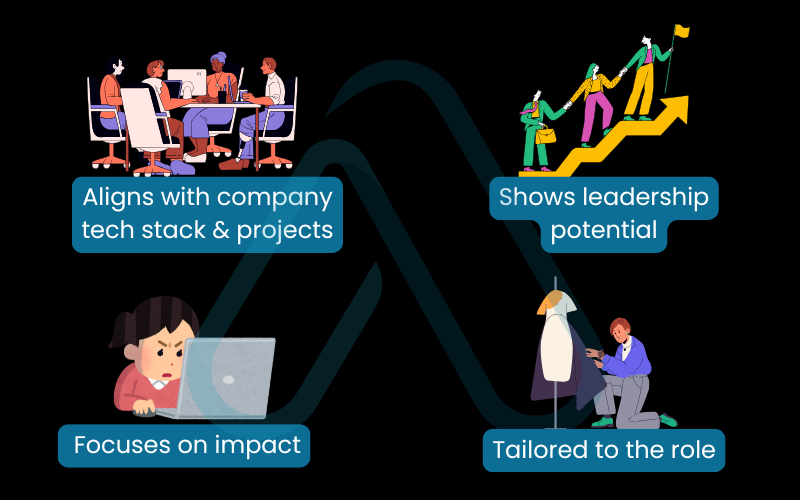
4.3. Example for the career changer
Role/Situation: Teacher moving into a Corporate Trainer role
My immediate goal is to apply my decade of experience in curriculum design and classroom management to your corporate training environment. I’m excited to learn your company’s specific training methodologies and become proficient in the learning management software you use. While I’m new to the corporate world, my core skills in making complex information digestible and engaging are directly transferable. In the next few years, my goal is to not only deliver excellent training but also to help evolve your programs. I want to use my background to develop new, innovative training modules that address emerging needs within your teams. My long-term career goal is to help build a culture of continuous learning that directly supports your business objectives. This is a core part of my career development strategies for this transition.
Why It Works:
- Bridges the Gap: It explicitly connects past experience (curriculum design) to the new role’s needs.
- Highlights Transferable Skills: Using strong tags like curriculum design and classroom management makes the connection impossible for the interviewer to miss.
- Shows Humility & Eagerness: It acknowledges the need to learn the new environment while showing confidence in core abilities.
- Future-Oriented: The long-term goal is about creating value for the company (improving training programs, building a learning culture).

4.4. Example for the aspiring leader
Role/Situation: Project Manager aiming for a Program Director role
My short-term goal is to excel in this Project Manager role by successfully delivering the upcoming product launch on time and within budget. I want to master your project management methodologies and build strong relationships across the different departments. As I look to the future, my career aspirations are focused on expanding my impact. I want to evolve from managing individual projects to leading strategic initiatives that align with the company’s broader business goals. Eventually, I hope to be in a position, perhaps like a Program Director, where I can oversee a portfolio of projects, mentor other project managers, and contribute to the strategic planning process to ensure all our efforts are driving maximum value for the company.
Why It Works:
- Respects the Current Role: It avoids sounding like they’re looking past the job they’re interviewing for, focusing first on excelling as a Project Manager.
- Strategic Language: It uses words like ‘strategic initiatives,’ ‘portfolio,’ and ‘business goals,’ showing they think like a leader.
- Focus on Influence, Not Title: The goal is framed around expanding responsibility and impact, not just getting a promotion.
- Company-Centric: The ultimate ambition is tied to creating more value for the business.
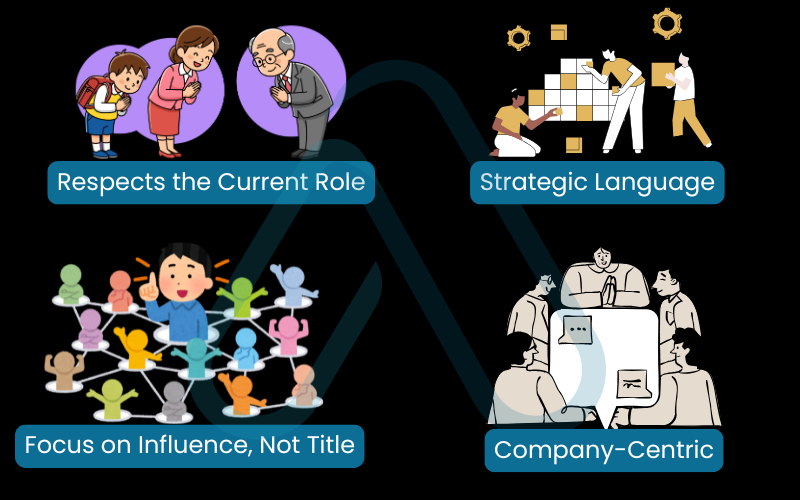
5. What are common mistakes to avoid when answering this question?
Part of providing a great answer is knowing what not to say. Based on my experience, I’ve compiled a list of the most common pitfalls I see candidates fall into. Avoiding these traps is just as important as implementing the strategies above. This section is designed to directly help you sidestep common mistakes when answering career goal questions.
Here is a quick guide to common mistakes and their smart fixes:
| The Mistake ❌ | The Smart Fix ✅ |
|---|---|
| Being Too Vague: ‘I want a role where I can learn and grow.’ | Be Specific: ‘I’m excited to grow my skills in data visualization using the Tableau platform, which I know your team uses.’ |
| Being Too Rigid or Demanding: ‘In two years, I expect to be promoted to Senior Manager.’ | Be Flexible: ‘I’m motivated by growth, and I hope that after proving my value over the next few years, I’ll be able to take on more senior responsibilities.’ |
| Making It All About Money: ‘My goal is to be earning a six-figure salary.’ | Focus on Impact and Skills: ‘My goal is to take on more complex projects that have a significant impact on the business.’ |
| Having Goals Unrelated to the Company: ‘I want to eventually start my own business.’ | Find the Overlap: Focus on the skills and experiences you want to gain that are relevant to the company for the foreseeable future (3-5 years). |
| Sounding Unsure: ‘I’m not really sure what my goals are right now.’ | Frame it as Exploration: ‘My immediate goal is to immerse myself in this industry and this role. I’m confident that by excelling here, my long-term path will become much clearer.’ |
6. Interactive worksheet: Define and refine your career goals answer
To make this process as easy and effective as possible for you, I’ve created a hands-on tool. This isn’t just another article; it’s a full system for your success. I’ve designed the ‘Career Goals Answer Worksheet’ to walk you through my 4-step framework, from self-reflection to drafting your final answer.
This worksheet provides dedicated space for you to:
- Answer the key self-reflection questions.
- Document your company research findings.
- Brainstorm points of alignment.
- Structure your ‘Present-Future’ answer.
Using this tool will transform the advice from this article into a personalized, interview-ready response. It’s an essential part of any thorough job interview preparation kit. Download it, fill it out, and walk into your next interview with unshakable confidence.
Download Your Free Career Goals Worksheet Now
7. Frequently asked questions
Here are my answers to some of the most common follow-up questions I receive about tackling the career goals question.
What’s the difference between short-term and long-term career goals?
I advise breaking them down in a way that aligns with a typical performance review cycle and a strategic outlook. Here’s a simple way to think about it:
- Short-Term Goals (1-3 years): These should be focused on performance and skill acquisition within the role you’re applying for. Think about mastering specific software, successfully completing a key project, or becoming the go-to person for a certain task.
- Long-Term Goals (3-5+ years): These relate to your broader career progression. They should be about taking on more responsibility, deepening your expertise, mentoring others, or moving into a role with greater strategic impact. A good answer will show how the short-term goals build toward the long-term ones.
How honest should I be if my long-term goal isn’t with this company?
This is a delicate but important question. My advice is to focus on tact and relevance. It’s not about being dishonest; it’s about finding the genuine overlap that exists for the foreseeable future (the next 3-5 years). You don’t need to volunteer that your ultimate dream is to start a consultancy or move to a different industry in ten years. Instead, frame your long-term goals in terms of skills and experiences that are valuable to *any* employer, including this one.
Focus on the journey, not just the final destination. The skills you build here are the most important part of your story for the next several years.
What if I’m not sure what my career goals are?
First, let me reassure you: this is completely normal, especially early in your career. Honesty, framed correctly, is the best policy. Instead of saying ‘I don’t know,’ frame your goal as one of intentional learning and exploration. You can say something like: ‘To be honest, my long-term picture isn’t crystal clear yet, and that’s why I’m so excited about this role. My immediate goal is to immerse myself in a company like yours and gain a deep understanding of the industry from the ground up. I’m confident that by focusing on performing well and learning as much as I can in this position, my future path will become clearer, and I believe that path can be built right here.’ This shows self-awareness and a mature, proactive approach. I also highly recommend using the self-reflection worksheet in this guide as a starting point to gain clarity.
Glossary of key terms
| Term | Meaning |
|---|---|
| Career Trajectory | The path of your career progression and the direction it is heading over time. |
| Transferable Skills | Abilities and knowledge that can be applied across different jobs and industries (e.g., communication, project management). |
| SMART Goals | A framework for setting effective goals that are Specific, Measurable, Achievable, Relevant, and Time-bound. |
8. Final thoughts
The ‘What are your career goals?’ question is more than a formality; it’s your chance to tell a compelling story about your future and invite the interviewer to be a part of it. A great answer is not about having a rigid, ten-year plan. It’s about demonstrating a strategic blend of authentic personal ambition and thoughtful company alignment. By following the framework I’ve laid out, you can turn this moment of potential anxiety into an opportunity to shine and set yourself apart from other candidates.
Here are the most critical takeaways to remember:
- Start with You: True confidence comes from self-awareness. Define your genuine career aspirations before you try to fit them into a company’s box.
- Connect the Dots: A great answer always links your personal goals to the company’s needs, creating a vision of mutual success.
- Use the ‘Present-Future’ Model: Ground your answer in the current role first, then connect it to a logical future within the organization.
- Authenticity Wins: Your unique story and genuine enthusiasm are far more powerful than any generic, scripted answer.
Mastering how to answer the career goals question is a learnable skill that sets top candidates apart. You are now equipped with the tools and strategies to do just that. Walk into that interview with the confidence that you’re not just answering a question—you’re starting a conversation about your future.
For more in-depth guides to help you advance in your professional life, I encourage you to explore our Career Growth and Productivity categories on Afdevinfo.com.
